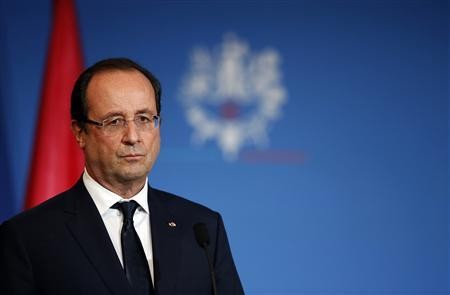
French President Francois Hollande appeared to be a troubled man in a defensive mode during a press conference on Tuesday. He also remained absolutely poised to shut down any questions that circulated around his personal life.
However, as ingenious as his evading tactics might be, journalists knew exactly how to tackle the man and he was forced to comment on his alleged affair with an actress, an event that had overwhelmingly overshadowed the press conference. The attention of every journalist present was focused on his affair with actress Julie Gayet that circulated after "Closer" magazine reported last week with pictures.
Hollande's speech that lasted for more than 30 minutes circulated around his military and strategic plans, tackling unemployment, economic growth and a spate of topics, while journalists were seen sitting down patiently waiting for him to say something on his affair. Reporters were seen grimacing and frowning as they were faced with a long speech, which seemed tedious and boring.
No sooner had he finished with his monotonous speech than a journalist grabbed the microphone and it was then that he had to face the inevitable bombshell.
The French journalist seemed to know exactly how to ask questions on a sensitive issue in a country where intruding into the private lives of people is still considered illegal. After a few seconds of revered 'good wishes' he gently twisted the question.
Instead of asking directly whether he had an affair with Julie Gayet, he talked about the fact that the president will be visiting the White House on 11 February and that his first lady will accompany him. He then gained himself a comfortable space to ask, "Is Ms. Valerie Trierweiler still the first lady of France?"
The answer Hollande gave was followed by a few seconds of intriguing silence and a blunt and nervous face: "Everyone in his or her personal life can go through ordeals - that's the case with us."
"But I have one principle," he continued with an energy that seemed covertly defensive in nature, "Private matters should be dealt with privately, out of respect for those involved. This is neither the place nor the moment to talk about such things".
If he thought that was the end to it, he was wrong. A journalist soon asked if he was indeed planning to sue the magazine that exposed his alleged affair. He appeared to quickly evade this question as well and left a bizarre sense of incompleteness as he said his "indignation is total" over the report and called it a "violation that touches a personal liberty" but he never denied the reports.
Another journalist found another angle to grill the president yet again. The reporter started by saying that he would not ask about his personal life. But he asked whether his security was enough while in private. He was criticized in the parliament for taking unreasonable risks with his security and the pictures that the magazine published also showed him in a bike driven by a chauffeur, without any security.
"My security is assured everywhere, and at any moment. When I travel officially...and when I travel on a private basis, I have protection that is less suffocating. But I am protected everywhere," he said, without talking about the pictures published in the magazine.
Towards the end of the conference, a journalist with the Agence France Presse tried his last bit to force the president to speak up about the matter but he was quickly shut down with the warning that in France there is a tradition where the private matters of people are not discussed in public.
Trieweiler is not married to the president, but is the official first lady of France. She is currently in hospital, recovering from a shock after the magazine published the story of his affair.
France has strict privacy laws which consider publishing information about a person's private life without permission, a serious offence. Closer magazine has come under controversy in the past as well, after it published photos of the Duchess of Cambridge Kate Middleton sunbathing topless during a holiday in France in September 2012.
Analysts are of the view that the magazine, which has come under harsh criticism, would not have reported the story without being completely sure, and that even if a legal action was to be taken against the magazine, it can never be ascertained that the story would cease appearing in the news.
More importantly, it can be said with certainty that the days ahead for the French president are going to be a troubled one and no matter how much he tries to evade the questions on his affair, they will follow him like shadows.














